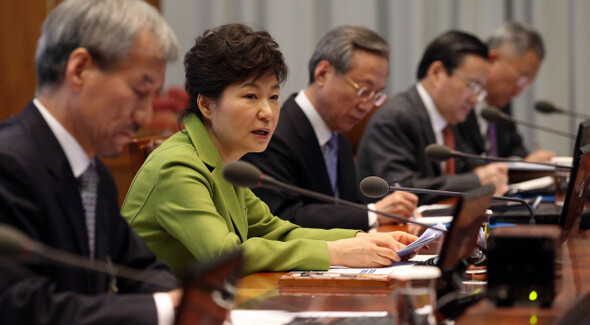hankyoreh
Links to other country sites 다른 나라 사이트 링크
Pres. Park’s ‘my way or the highway’ North Korea policy

By Choi Hyun-june, staff reporter and Seok Jin-hwan, Blue House correspondent
President Park Geun-hye has been taking a confused approach to North Korea recently, following up her emphasis on inter-Korean exchange and cooperation in a late March speech in Dresden with mention of “internal insecurities” at an Apr. 7 meeting of Blue House senior secretaries.
Analysts are now saying that Park’s “my way or the highway” approach, which may work in the domestic politics where she has a solid support base, is now being extended to inter-Korean relations as well.
Speaking at a meeting at the Blue House on the morning of Apr. 7, Park prefaced her remarks by saying, “North Korea’s decision not long ago to break the agreement it had with Seoul not to engage in slander or provocations may be an attempt to shut down internal insecurities.” The claim is that Pyongyang has been attempting to quiet internal concerns by engaging in slander and provocations against the South, in defiance of an agreement the two sides reached on a moratorium in mid-February.
Park’s primary aim may have been to respond to recent remarks in the North Korean media that denounce her by name. But her decision to make such a blunt reference to “internal insecurities” in North Korea is also seen as somewhat unusual. Moreover, the perceived provocations in the remarks could get in the way of realizing some of the aims she laid out in the Dresden speech.
Indeed, signs already point to North Korea taking her remarks as slanderous. While laying out her “three-point proposal” to North Korea in the Dresden speech, she used a number of expressions that could upset Pyongyang, including references to “famine-stricken North Korean children” and a “nonstop string of defections that continues to this day.”
Speaking on condition of anonymity, a senior government official warned of the consequences of ill-chosen language.
“President Park really didn’t show any consideration for the other side when she said that,” the official said. “When you go overseas and start talking about how North Korea is ‘starving,’ they’re going to have a tough time accepting your proposal even if they wanted to.”
Questions are even being raised about her commitment to reunification, with analysts characterizing her approach as “shaking hands and slapping their face at the same time.” The charge is that her “North Korea policy” isn’t aimed at the North at all, but is purely for South Korean political effect.
The “my way” approach can sometimes be an asset, since it means Park is not letting the situation dictate her response. In the same opening remarks on Apr. 7, she went on to say, “This is all the more reason we need to keep making efforts to solve the humanitarian issues affecting North Korea’s people, build infrastructure for the public welfare, and restore parity between people in South and North Korea.” This reads as a pledge of continued efforts at exchange and cooperation in spite of the creeping tensions between the two sides.
The problem could be that all of the proposals were focused squarely on the North Korean people. Many said this emphasis in the three-point proposal in Dresden - resident humanitarian issues, resident infrastructure, parity with South Korean residents - was the result of an approach that views the North Korean administration and people as intrinsically separate. It’s also a view of the North Korea held by many conservatives in South Korea and the US.
“While it’s more forward-thinking that what’s come before, this Dresden speech is going to seem off-putting to the regime in Pyongyang because it separates out the regime and the public and talks about support as a way of ‘improving people’s lives,’” said Dongguk University professor Koh Yu-hwan.
Please direct questions or comments to [english@hani.co.kr]

Editorial・opinion
![[Editorial] Does Yoon think the Korean public is wrong? [Editorial] Does Yoon think the Korean public is wrong?](https://flexible.img.hani.co.kr/flexible/normal/500/300/imgdb/original/2024/0417/8517133419684774.jpg) [Editorial] Does Yoon think the Korean public is wrong?
[Editorial] Does Yoon think the Korean public is wrong?![[Editorial] As it bolsters its alliance with US, Japan must be accountable for past [Editorial] As it bolsters its alliance with US, Japan must be accountable for past](https://flexible.img.hani.co.kr/flexible/normal/500/300/imgdb/original/2024/0417/6817133413968321.jpg) [Editorial] As it bolsters its alliance with US, Japan must be accountable for past
[Editorial] As it bolsters its alliance with US, Japan must be accountable for past- [Guest essay] Amending the Constitution is Yoon’s key to leaving office in public’s good graces
- [Editorial] 10 years on, lessons of Sewol tragedy must never be forgotten
- [Column] A death blow to Korea’s prosecutor politics
- [Correspondent’s column] The US and the end of Japanese pacifism
- [Guest essay] How Korea turned its trainee doctors into monsters
- [Guest essay] As someone who helped forge Seoul-Moscow ties, their status today troubles me
- [Editorial] Koreans sent a loud and clear message to Yoon
- [Column] In Korea’s midterm elections, it’s time for accountability
Most viewed articles
- 1[Column] The clock is ticking for Korea’s first lady
- 2Samsung barricades office as unionized workers strike for better conditions
- 3[Editorial] When the choice is kids or career, Korea will never overcome birth rate woes
- 4[Guest essay] How Korea turned its trainee doctors into monsters
- 5Why Israel isn’t hitting Iran with immediate retaliation
- 6S. Korea, Japan reaffirm commitment to strengthening trilateral ties with US
- 7Japan officially says compensation of Korean forced laborers isn’t its responsibility
- 8[Editorial] As it bolsters its alliance with US, Japan must be accountable for past
- 9Korea, Japan jointly vow response to FX volatility as currencies tumble
- 10‘Right direction’: After judgment day from voters, Yoon shrugs off calls for change